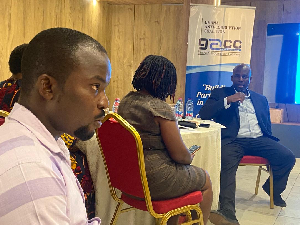The Ghana Anti-Corruption Coalition (GACC), in partnership with the Ghana Integrity Initiative (GII) and the African Centre for Energy Policy (ACEP), organized a media capacity-building workshop aimed at strengthening journalists' understanding of governance and anti-corruption reforms in the country.
The one-day event, held in Accra on October 22, 2024, attracted journalists from both public and private media houses.
With financial backing from the UK’s Foreign, Commonwealth & Development Office (FCDO), the workshop forms part of the broader project titled "An Anti-Corruption Initiative for Enhancing Governance and Accountability."
The initiative aims to empower the media with the knowledge and tools needed to intensify their contributions to Ghana’s fight against corruption and promote transparency within public institutions.
Dr. John Osae-Kwapong, Project Director of the Democracy Project and Fellow at CDD-Ghana highlighted the importance of addressing systemic corruption.
He reflected on previous efforts to curb corruption in Ghana, noting that recent Afrobarometer reports suggest that much remains to be done.
"There was a period when we were doing well in the fight against corruption, but in the last couple of rounds of Afrobarometer, you can see that there is a lot more to be done," Dr. Osae-Kwapong said.
He further stressed that corruption goes beyond high-profile political scandals, drawing attention to conflicts of interest, which often go unnoticed by the public.
"People don’t know that conflict of interest is also corruption, but it forms an act of corruption. So, there should be a law to deal with such people," he added.
He emphasised the need for laws that address these hidden facets of corruption, particularly within the civil service.
Mary Addah, Executive Director of the Ghana Integrity Initiative (GII), underscored the role that transparency and public engagement play in the fight against corruption.
She pointed out that citizens' inability to access vital information hampers their ability to hold public officials accountable.
"When citizens do not have access to vital information, their ability to hold officials accountable is compromised," Addah said.
She also highlighted governance challenges, such as opaque public procurement processes, which continue to erode public trust in institutions.
"It is time to depart from the top-down approach to fighting corruption... and rather build the capacity of citizens to appreciate the devastating effects of corruption," she said.
“I have learned a lot, especially about how to report on corrupt issues in the country,” one of the journalists said.
“Corruption is really destroying our beautiful country so having an in-depth understanding of how to tackle it, is the way to go, “another added.
AM/KA
Watch the latest episode of #SayItLoud below:
General News of Thursday, 24 October 2024
Source: www.ghanaweb.com













